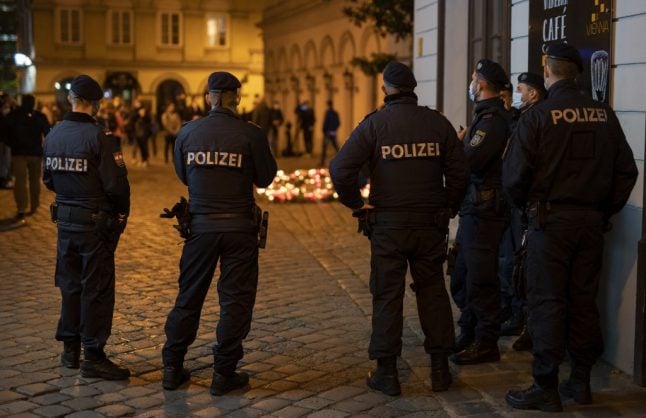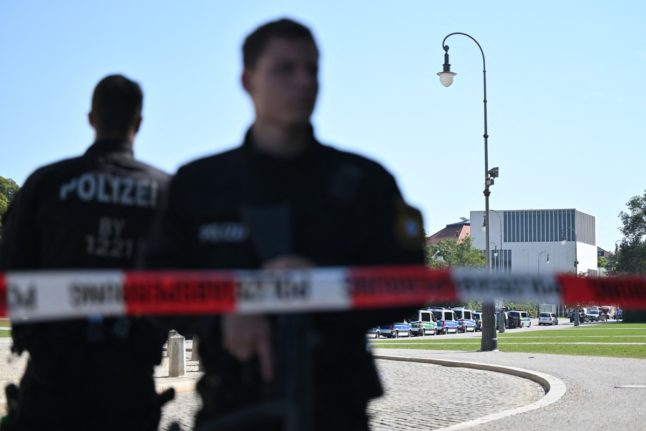Erich Zwettler, the head of Vienna's anti-terror agency, had “asked to be suspended from his functions”, Vienna police chief Gerhard Puerstl told a press conference, as further embarrassing revelations came to light of missed opportunities to prevent the bloodshed.
During Monday night's rampage, the first major terror attack in decades in Austria, a 20-year-old man who had previously been jailed in Austria for a terror offence opened fire on passersby with a Kalashnikov in central Vienna, causing shock and anger.

People attend a candlelight vigil remembering the victims of the terrorist attack in Vienna, Austria on November 5, 2020. JOE KLAMAR / AFP
Zwettler's position became untenable in the light of “obvious and intolerable” failures, Interior Minister Karl Nehammer said, after revealing that gunman Kujtim Fejzulai had been in contact with people who had been on the radar of the German intelligence agencies.
A tip-off from German intelligence about these meetings had apparently not led to increased surveillance of Fejzulai, who at the time was following an Austrian de-radicalisation programme having been released early from jail.
Earlier this week, it came to light Austrian intelligence officials had also been warned by their counterparts in neighbouring Slovakia that Fejzulai had attempted to buy ammunition earlier this year.
Nehammer himself has come under pressure in the days since the attack with sharp criticism coming from opposition parties that the failures had taken place under his watch.
On Friday, the government ordered the closure of two mosques frequented by Fejzulai which had allegedly furthered his radicalisation.
READ ALSO: Half of those arrested after Vienna attack ‘had violent crime convictions’
'Radical' mosques
The dual Austrian-Macedonian, who was shot dead by police, had been convicted in April 2019 for trying to join the Islamic State group in Syria, but released early in December on probation.
Nehammer said earlier this week that Fejzulai had managed to “fool” the de-radicalisation programme, attendance of which had been a condition of his release.
Integration Minister Susanne Raab said on Friday that the government's religious affairs office “was informed by the interior ministry that Monday's attacker, since his release from prison, had repeatedly visited two Vienna mosques”.
The two institutions are in Vienna's western suburbs, one called the Melit Ibrahim mosque in the Ottakring district, and the other being the Tewhid mosque in the Meidling area.
The BVT domestic intelligence agency “told us that the visits to these mosques furthered the attacker's radicalisation,” Raab said.
Only one of the mosques was officially registered as such, Raab said.
A statement from the Islamic Religious Community of Austria (IGGOe) said one officially registered mosque was being shut because it had broken rules over “religious doctrine and its constitution”, as well as national legislation governing Islamic institutions.
“Religious freedom is something precious in our country that we must and will protect – including from those within our own ranks,” said IGGOe President Umit Vural.

Peter Huber (C), Austrian ambassador to Germany, lays flowers during a vigil remembering the victims of the terrorist attack in Vienna, outside the Austrian embassy in Berlin on November 6, 2020. OMER MESSINGER / AFP
Also on Friday, the Vienna prosecutor's department said that of the 16 people arrested in the wake of the attack, eight of them aged between 16 and 24, were suspected of “supporting the perpetrator in the run-up to attack” while another six had been released.
The probe into the attacker's circle has spread to Austria's neighbours, with investigations ongoing in Switzerland and Germany.
On Friday, German police said they had raided apartments and offices in the north-east of the country used by four people who might have had links to Fejzulai.
“Two of the individuals are believed to have met the suspected assailant in July 2020 in Vienna,” Germany's federal criminal agency said.
Prosecutors in Switzerland have confirmed that two Swiss men aged 18 and 24 who were arrested on Wednesday had already been the targets of criminal cases over terrorism offences.



 Please whitelist us to continue reading.
Please whitelist us to continue reading.
Member comments